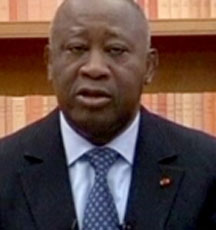THE HAGUE, (Reuters) – Former Ivory Coast President Laurent Gbagbo was arrested and flown to The Hague overnight to face charges of crimes against humanity at the International Criminal Court, the first former head of state to be tried by the ICC since its inception in 2002.

The world’s top war crimes court opened an investigation last month into killings, rapes and other abuses committed during a four-month conflict in Ivory Coast triggered by Gbagbo’s refusal to cede power to Alassane Ouattara in an election last year.
Fadi El Abdallah, an ICC spokesman, said Gbagbo would make an initial appearance in court within a few days, where he would be informed of his rights and the charges brought against him.
“Mr Gbagbo allegedly bears individual criminal responsibility, as indirect co-perpetrator, for four counts of crimes against humanity, namely murder, rape and other forms of sexual violence, persecution and other inhuman acts,” the ICC said in a statement on Wednesday.
Gbagbo’s arrest and detention in The Hague was welcomed by human rights groups, but could prove divisive in Ivory Coast and trigger unrest among his supporters.
The timing of the transfer is particularly sensitive, coming just days before a Dec. 11 parliamentary election which Gbagbo’s FPI party is already boycotting in protest at the treatment of its top officials arrested in connection with the conflict.
Gbagbo’s aides have already branded the ICC “victor’s justice”, saying it demonstrates the bias of international players towards former top IMF executive Ouattara, who came to power only after French soldiers helped him oust Gbagbo.
Gbagbo’s arrest marks a big breakthrough for the ICC prosecutor, Luis Moreno-Ocampo, who has up to now struggled to get hold of some of his biggest targets.




